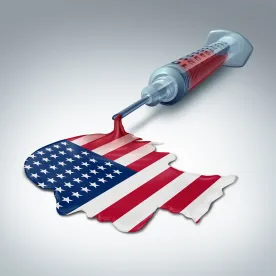This Week’s Dose
Congress is close to a deal to fund the government as well as provide further coronavirus (COVID-19) relief, although work will continue over the weekend. The Food and Drug Administration (FDA) approved the first COVID-19 vaccine for emergency use, and is expected to
Congress
Congress Expected to Finalize $900 Billion in COVID-19 Relief. House and Senate lawmakers are reportedly nearing a deal on COVID-19 relief and stimulus legislation that resembles a proposal introduced by the bipartisan bicameral working group earlier this week. The bill is expected to include direct grants to states and localities and funding for the Centers for Disease Control and Prevention (CDC) to support vaccine distribution, along with funding for states for testing and contact tracing efforts, and additional money for the Provider Relief Fund (PRF). The bill is also expected to include additional funding for the Paycheck Protection Program to support small businesses, and another round of direct stimulus checks to individuals. Funding for state and local aid and liability protections for businesses, two provisions that were championed by House Speaker Nancy Pelosi (D-CA) and Senate Majority Leader Mitch McConnell (R-KY), respectively, have been set aside for now. Congress may take up these and other additional COVID-19 relief efforts in the New Year. The relief bill will likely be coupled with surprise billing legislation and government funding for fiscal year (FY) 2021 (more on that below) to be advanced as a single year-end package this weekend.
Surprise Billing is Back. Late last week, House and Senate committee leadership announced that they had reached a deal on surprise billing, which could be included in the year-end package. The compromise, which was agreed to by the Senate Health, Education, Labor and Pensions Committee, and the House committees on Energy and Commerce, Ways and Means, and Education and Labor, resembles the proposal Ways and Means introduced last year. The payment dispute resolution process allows for independent negotiations and then a prescribed arbitration process if those negotiations fail. The agreement comes after two years of congressional efforts to protect patients from surprise medical bills; however, providers and plans continue to oppose certain aspects of the legislation. This will remain a key issue to watch as lawmakers work to finalize a deal over the weekend.
Congress Expected to Fund the Government for FY 2021. After months of negotiations, the House and Senate is close to an agreement to fund the government for the remainder of fiscal year 2021. The bill will provide funding for the Department of Health and Human Services (HHS), likely above current levels, as well as for the CDC and the National Institutes of Health. The bill is also expected to allocate funding for pandemic preparedness and for hospitals to improve planning for disasters. It will also likely extend funding for a group of expiring healthcare programs known as the healthcare extenders (Special Diabetes programs, community health centers, teaching hospitals, the National Health Service Corps, and a delay of Medicaid Disproportionate Share Hospital payment reductions). The House could pass the legislation, including the COVID-19 relief and surprise billing proposals mentioned above, as early as today (December 18), and the Senate is expected to pass it over the weekend or possibly Monday. In the meantime, to avert a government shutdown when current government funding expires at midnight tonight, Congress will likely pass a measure to maintain funding at current levels through December 21.
Administration
FDA Approved First COVID-19 Vaccine in the United States, with a Second Expected Today. FDA issued Emergency Use Authorization for Pfizer’s COVID-19 vaccine late last week and is expected to do the same for Moderna’s vaccine today (December 18) after an endorsement from the Vaccines and Related Biological Products Advisory Committee on Thursday. Shipments of the first dose of Pfizer’s vaccine went out over the weekend, and vaccinations, primarily of frontline healthcare workers, have begun. The Advisory Committee on Immunization Practice (ACIP), the expert panel that advises the CDC, will review Moderna’s vaccine this weekend. ACIP will also consider how to prioritize vaccination beyond healthcare workers and residents of long-term care facilities. For more information on the novel issues that healthcare providers should examine as we navigate the vaccination process, check out this discussion with healthcare, employment and health policy leaders from McDermott Will & Emery and McDermott+Consulting.
HHS Announced Phase 3 PRF Distribution. The Department began distributing $24.5 billion to over 70,000 providers in the latest round of funding from the Provider Relief Fund (PRF). In addition to allowing new applicants, Phase 3 allowed providers who had already received payments of approximately 2% of annual revenue from patient care to apply for additional funding for up to 88% of their reported financial losses and changes in operating expenses caused by COVID-19. The total amount announced this week is $4.5 billion more than the initial $20 billion that HHS announced for Phase 3 in October. Of the Phase 3 funding distribution, HHS reports that nursing homes will receive $1.10 billion, and ambulance and transportation services will receive $1.48 billion. A state-by-state breakdown of the first batch of Phase 3 payments can be found here. We expect that the Trump Administration will try to deplete the fund before the Biden Administration takes over but are awaiting information on where the remaining $24 billion will go.
Quick Hits
-
Senate Finance Committee Ranking Member Ron Wyden (D-OR) sent a letter to Chairman Chuck Grassley (R-IA) urging him to begin the Committee’s consideration of Xavier Becerra to be Secretary of HHS.
-
A group of Senate Democrats sent a letter to the Administration raising concerns that the country could be facing a “vaccine cliff” if supply runs out.
-
The Centers for Medicare and Medicaid Services (CMS) released a new Frequently Asked Questions document on the Community Health Access and Rural Transformation Model.
-
CMS announced a new opportunity for Medicaid Managed Care Organizations to participate in the Professional and Global options of the Direct Contracting Model for 2022. The application is not yet available.
-
CMS has pushed back the deadline for doctors to apply for extreme and uncontrollable circumstances exceptions from the Merit-based Incentive Payment System to February 1, 2021, and is reminding providers that that process can include a request to leave out one or more performance categories from their score due to the COVID-19 pandemic. The hardship application for the interoperability category will still have a December 31, 2020, deadline.
-
FDA granted Emergency Use Authorization to the first over the counter, fully at-home COVID-19 test.
-
The Office of Management and Budget directed HHS to pause implementation of the Trump Administration’s plan to distribute $200 drug discount cards to Medicare beneficiaries, which has raised legal concerns.






 />i
/>i
